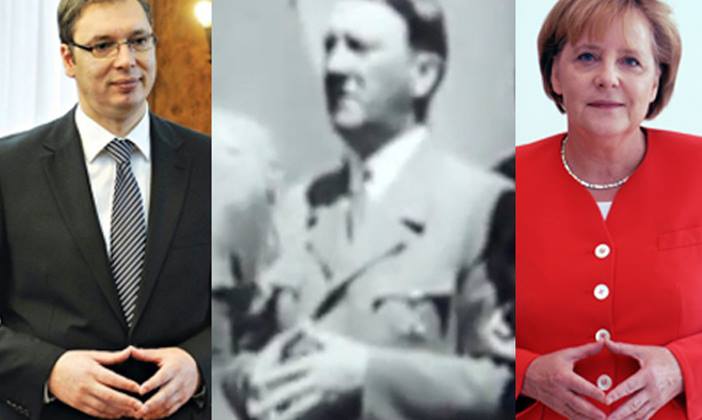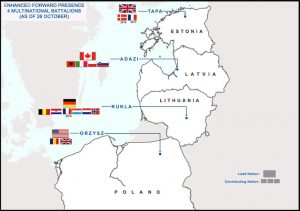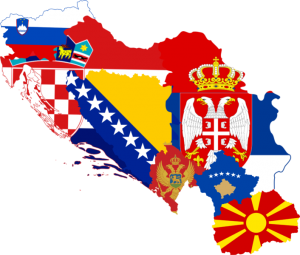
Views: 1093
The collective West is busy showing what it thinks of Serbia’s determination to conduct an independent policy through an old-fashioned show of force.
The weekend of March 27-28, thousands of vehicles from neighboring countries formed lines waiting to enter Serbia. The reason? Vaccines. For free. Lots of them, from both East and West. Sputnik V, Sinopharm, AstraZeneca, Pfizer. More than the rest of the ex-Yugoslav republics combined. And Serbia decided to open its doors to those among its former compatriots who have lost all hope that their Western-approved “democracies” would obtain them in respectable quantities any time soon.
So, does this humane gesture make Serbia a white hat in Western eyes? Of course not. Silly question. Did the saintly Western democracies spend all those years and millions in demonizing the region’s largest and most influential country only to blithely give up the divide et impera policy so successfully applied during the dismantling of ex-Yugoslavia? Just because lives are at stake? Another silly question. Come on, this is the zero-sum West we’re talking about. The world is divided into winners and losers. Those that obey, even at their own expense, are the “good guys,” and those that don’t – are not. “Win-win” is not an option.
In fact, the collective West is busy showing this spring just what it thinks of Serbia’s determination to conduct an independent, multilateral and – egads! – pro-multipolar policy through an old-fashioned show of force. In a rare journalistic display of directness, the EU-related EURACTIV news site ran the following headline announcing the entire enterprise: “NATO, U.S. to stage large-scale military exercises around Serbia until summer.” The accompanying map of the Defender-Europe 21 operation, as it is officially called, is even more to the point, eerily recalling the encirclement of Yugoslavia by Axis forces in April 1941. Hard to find clearer messaging that that.
Imagine if the 30,000 or so soldiers slated to participate in the event were instead deployed to deliver vaccines and mobile field hospitals to the virus-stricken region. But it seems that the Serbian pro-multipolar “virus” is raising more alarm in Western capitals than the actual pandemic. And it needs to be contained, or at least isolated. Can’t have the entire region weaning itself off the neoliberal, er… democratic teat and start looking collectively in any other direction but due West, can we?
Consider the recently adopted European Parliament resolution on Serbia, especially its “concerns” regarding the country’s efforts to pursue balanced external relations:
“77. [The EP] Expresses concern about China’s increasing influence in Serbia and across the Western Balkans and the lack of transparency and environmental and social impact assessment of Chinese investments and loans; calls on Serbia to strengthen its legal compliance standards for Chinese business activities;
“87. Reiterates the importance of alignment with the EU common foreign and security policy (CFSP), which must progressively become an integral part of Serbia’s foreign policy as a condition for the accession process; expresses concern about Serbia’s alignment rate, which is the lowest in the region; notes that some government officials and some politicians continue to make occasional statements that call into question Serbia’s foreign policy orientation; is concerned by Serbia’s repeated support for Russia in the UN General Assembly over the annexation of Crimea;
“88. Welcomes the fact that Serbia aligned with the EU’s position on the presidential elections in Belarus; remains concerned, however, that Serbia has failed to align with the sanctioning of Belarusian officials and with the EU’s position on the new security law in China; calls on Serbia to increase its level of alignment with the declarations of the High Representative of the Union for Foreign Affairs and Security Policy on behalf of the EU, and with Council decisions;
“98. Expresses concern over Serbia’s increasing dependence on defence and security equipment and technologies from the People’s Republic of China, including a mass surveillance system in Belgrade and mass personal data collection without appropriate safeguards, and the insufficient transparency of the security sector’s public procurement practices; continues to be concerned about Serbia’s close political and military cooperation with Russia, including the continued presence of Russian air facilities in Niš; calls on Serbia to align with the CSDP and its instruments…”
Add to this the periodic calls for NATO to wrap up its “unfinished business” in the Balkans, or the constant stream of “concern” with Russian or Chinese “malign influence” in the region, and the picture of the never-ending Western obsession with Serbia and its stubborn independent streak becomes complete.
Recently, the country marked the 22nd anniversary of the beginning of NATO’s illegal “humanitarian” intervention against ex-Yugoslavia, which took an untold human(itarian) and, yes, ecological, toll on Serbia’s population. Unlike the totally unrepentant West, both Russia and China made sure to call this Western campaign by its real name – “aggression” – and made a public show of solidarity with Serbia. This was especially the case with the Chinese defense minister Wei Fenghe, whose three-day visit to Serbia, fortuitously coinciding with the anniversary, also provided the opportunity for China to send some unequivocal messages of its own.
As he laid wreaths at the site of the Chinese embassy “accidentally” bombed by a U.S. B-2 “stealth” bomber on May 7, 1999, when three Chinese journalists were killed and 20 people injured, Wei stated that “the Chinese military will never allow history to repeat itself as China is capable and determined to defend its national interests.” For her part, Chinese Foreign Ministry Spokesperson Hua Chunying added that NATO “still owes blood debt” to the Chinese people and that “it shall not be forgotten that the U.S.-led NATO blatantly bombed Yugoslavia in 1999 in a severe violation of relevant international conventions and basic norms of international relations.”
In fact, there is ample proof that NATO’s 78-day attack on Serbia and Montenegro was not the least bit “humanitarian” in its purpose but had an ice-cold geopolitical raison. Perhaps the key public proof of this was provided by Willy Wimmer, former member of the German Bundestag and Vice President of the Parliamentary Assembly of the OSCE, in a letter written to then German Chancellor Gerhard Schröder on May 2, 2000, or less than a year after NATO’s illegal operation.
Wimmer’s 11-point brief of what was said at a closed security conference organized in Bratislava by the U.S. State Department included the following key points:
“4. The war against the Federal Republic of Yugoslavia was waged in order to rectify General Eisenhower’s erroneous decision during World War II. Therefore, for strategic reasons, American troops must be stationed there, in order to compensate for the missed opportunity from 1945.
“7. It would be good, during NATO’s current enlargement, to restore the territorial situation in the area between the Baltic Sea and Anatolia such as existed during the Roman Empire, at the time of its greatest power and greatest territorial expansion.
“8. For this reason, Poland must be flanked to the north and to the south with democratic neighbor states, while Romania and Bulgaria are to secure a land connection with Turkey. Serbia (probably for the purposes of securing an unhindered U.S. military presence) must be permanently excluded from European development.
“11. The claim that, during its attack on the Federal Republic of Yugoslavia, NATO violated all international rules, and especially all the relevant provisions of international law – was not disputed.”
No less devastating was the experienced German diplomat’s own conclusion:
“It seems that the American side, for the sake of its own goals, is willing and ready to undermine, on a global scale, the international legal order, which came about as a result of the two world wars in the previous century. Force is to stand above law. Wherever international law stands in the way, it is to be removed.
“When the League of Nations experienced a similar fate, World War II was not far off. The manner of thought that takes into regard solely its own interests can only be referred to as totalitarian.”
This is the stuff for some future iteration of the Nuremberg trials, where the crime of aggression was identified as “the supreme international crime differing only from other war crimes in that it contains within itself the accumulated evil of the whole.” For now, it can at least serve as a handy tool in the current global info war, another reminder of the foreign policy roots of some of the self-styled moral crusaders staffing the Biden Administration, such as Anthony Blinken, who openly invokes the reprehensible Madeleine Albright as a “role model.”
So, if having a war of aggression named after you and causing the death of half a million Iraqi children was “worth it” in Albright’s mind, the untold millions being spent in efforts at eradicating all traces of multipolarity from European soil, instead of helping alleviate the region’s health crisis, are most certainly “worth it” in the minds of her political and spiritual successors in the White House and across the Atlantic.
In any case, the situation in and around Serbia, Europe’s most stubborn multipolar outpost, is bound to heat up in the near future.
Originally published on 2021-04-02
About the author: Aleksandar Pavic is an independent analyst and researcher.
Source: Strategic Culture Foundation
Origins of images: Facebook, Twitter, Wikimedia, Wikipedia, Flickr, Google, Imageinjection, Public Domain & Pinterest.
Read our Disclaimer/Legal Statement!
Donate to Support Us
We would like to ask you to consider a small donation to help our team keep working. We accept no advertising and rely only on you, our readers, to keep us digging the truth on history, global politics, and international relations.
FOLLOW US ON OUR SOCIAL PLATFORMS










